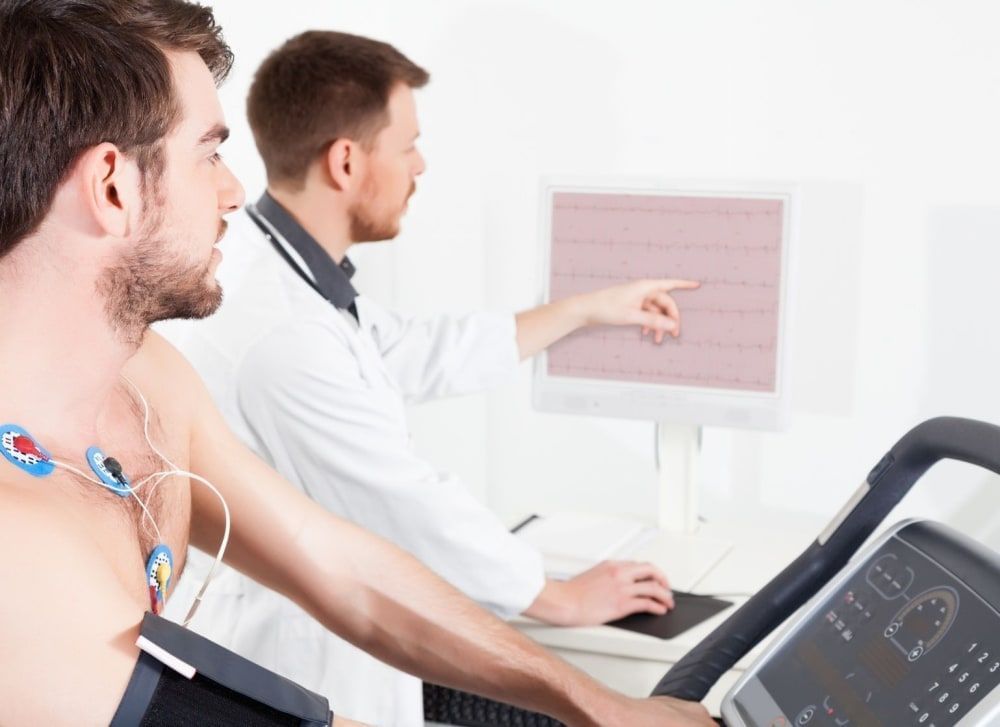TMT Test (Treadmill Test): Cost, Purpose, Procedure, and Risks

The TMT Test (also called the treadmill test) measures the heart's reaction to excessive stress conditions in a medical setting.
In this test, you'll be asked to exercise - typically on a treadmill - while hooked up to an electrocardiogram (EKG) machine. This will allow your doctor to monitor your heart rate.
Let's understand this test in more detail and analyze its effectiveness.

What Is the TMT Test for the heart?
TMT or the Treadmill Test is an electrocardiogram (ECG) test taken while walking on a treadmill. It monitors the heart rhythms. It can also be performed while you are cycling a stationary bike. TMT test for heart involves monitoring heartbeat, breaths per minute, and blood pressure. TMT is also known as the stress test.
Usually, doctors recommend TMT to people who have symptoms of angina (a chest pain that occurs due to obstruction of blood flow to the heart), people with a history of heart attack, and those who have been through bypass surgery.
TMT Test Full Form
TMT stands for Treadmill Test. This test is done to find the stress on your heart. It helps determine how far your heart can go before it experiences an abnormal rhythm or blood flow decreases.
Why is the TMT Test done?
TMT determines the performance of the heart in strenuous situations. The primary purpose of doing a TMT is to diagnose any cardiovascular disease. The following are the reasons why the TMT test is done:
- Diagnose heart arrhythmia:- Since TMT helps monitor ECG, it helps diagnose if you have a heart arrhythmia or irregular heartbeat.
- Confirm coronary artery disease:- The TMT result helps determine the percentage of heart blockage and diagnose coronary heart disease.
- Ensure the heart is healthy before a major surgery:- TMT result also confirms if it is safe to perform a heart surgery like bypass or any other major surgery.

TMT Test for heart Process
For the TMT, the medical professional will first ask you to remove your regular clothes and wear a gown, and electrodes will be attached to your chest.
Then, you will be asked to walk on the treadmill. The pace of the treadmill will increase slowly and gradually. Your heartbeat, breathing rate, and blood pressure will be monitored while you walk on the treadmill. As soon as the doctor gets the desired result, you can get down from the treadmill.
People are usually kept under observation for some time after TMT to ensure that heartbeat and blood pressure come back to normal.
Which Test Is Better TMT or 2d Echo?
2d Echo is an ultrasound of your heart. It is used to check the pumping of your heart and the functioning of its valves. It cannot diagnose blockage of the heart, which is the primary function of the TMT test. Ideally, a combination of both tests is recommended to determine the health of your health.
Also Read: उच्च ESR (ईएसआर) कारणों और उपचार हिंदी में | ESR Test in Hindi
The Risks of TMT Test
TMT is a safe test performed by medical professionals in a controlled environment. However, it should not be done without a reason as there are certain risks of the TMT test, especially for asymptomatic patients. If the patient has no symptoms of heart disease and the test result turns out to be positive, it can cause unnecessary stress and high blood pressure. Also, in some cases, people may suffer from a heart attack during TMT. However, such cases are rare. As per research, 1 out of 10,000 people may suffer from a heart attack during TMT.
Following are some other risks associated with the TMT test:
- Collapsing or fainting while walking on a treadmill.
- Heartbeat remains irregular for a long time after the test.
- Experiencing chest pain.

TMT Test Price
The average cost of a TMT test ranges between INR 1800 and INR 2500.
Precautions You Should Take Before Undergoing TMT
Doctors recommend the following precautions before undergoing TMT:
- Do not have any meal two hours before TMT. However, it is okay to have water.
- Start brisk walking a few days before TMT.
- Avoid tea, coffee, or alcoholic beverages before TMT.
- Asthma patients should take their inhalers before TMT.
What is the TMT Test Normal Range?
During TMT, if the heartbeat, blood pressure, and breathing increase at a normal pace, there is nothing to worry about. It means that you do not have a potential risk of coronary heart disease. The normal heart rate under stress varies according to age. You can calculate it by subtracting your age from 220. For example, the normal heart rate for 50-year-old people will be 170.
TMT Test Positive Means?
A positive TMT result can mean that you have angina. In simple terms, it means there is a lack of blood supply to your heart in stressful situations. It could be due to underlying heart disease. It can also indicate that you may have 70% blockage in your arteries and have coronary heart disease. However, one cannot be sure about the result; it can also be false. Therefore, if you have no symptoms and the result is positive, it is best to get the TMT done again.
TMT Test Negative Means?
A negative TMT result means that the heart rate increases without any significant changes in the ECG graph. It means that there is no heart blockage. A negative TMT result indicates that you do not have ischemic heart disease, and your heart receives regular blood supply even during strenuous situations.

Summing Up on Tmt Test (Treadmill Test)
Treadmill Testing is an electrocardiogram (ECG) test performed while walking on a treadmill. It monitors the rhythm of the heart.
A doctor typically recommends TMT for people who suffer from angina, have had a heart attack, or have undergone bypass surgery.
You may not need additional tests if your exercise stress test confirms that your heart function is normal.
In the event that your stress test results indicate coronary artery disease or arrhythmia, your doctor may decide to prescribe additional tests, such as a coronary angiogram.
FAQ
1) Why TMT Test Is Required?
A TMT Test is required for the following reasons -
- Assessing the cause of unexplained but steady chest pain and determining whether it is coronary artery disease
- Checking for abnormal heart rhythms
- Assessment of chest pain or irregular heartbeat treatment or medication effectiveness
- Monitoring your heart's blood flow as you become more active
- To make sure your heart valves are functioning properly
- Detecting if symptoms such as fainting, palpitations or dizziness are related to heart disease
- Assessment of a person's ability to tolerate exercise if the person has heart disease, a heart attack, or a heart surgery
- To make sure your exercise routine is safe
- CAD (Coronary Artery Disease) screening for persons without symptoms, particularly if they are prone to the disease
2) Can We Eat Before Tmt Test?
It is recommended to not eat or drink anything before the test for four hours except for water. Avoid all products that contain caffeine and smoking for 24 hours before the test.
3) What Happens if I Fail a Stress Test?
Short answer: nothing happens. It is quite common for some people to not be able to exercise enough to get their hearts to work hard enough. During their stress component, patients usually cannot exercise sufficiently or achieve an adequate heart rate. This could also be caused by completely unrelated symptoms like feeling lightheaded due to low blood sugar, having a painful leg, or having arthritis or joint pain due to a sprained ankle. It is possible that the doctor would recommend another stress test to provide a better assessment.
4) How Long Does Tmt Test Take?
Usually, A TMT test is conducted for 15 minutes. You'll walk on a treadmill or pedal a stationary bicycle.
